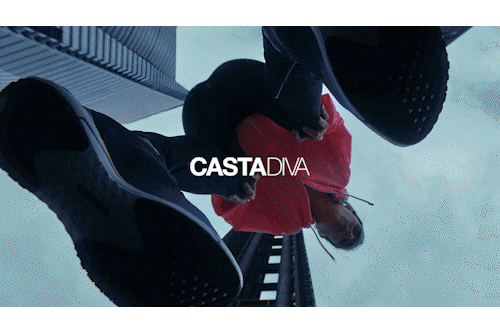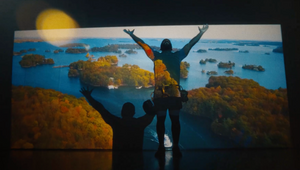
Uprising: How Amar Chebib Embraces the Power of Empathetic Storytelling

“I have strong views about how fucked up the world is, but I’m in love with and have faith in what is most essential about being human.” These words perfectly represent director Amar Chebib’s story; the road that led him to the industry, his time in it, everything - even down to his childhood years.
Born to a Syrian father and Canadian mother, Amar was quiet, sensitive, and didn’t quite fit in anywhere. Describing himself as a “hybrid third culture kid” - not white enough for the white kids, and not Arab enough for the Arab kids - he recalls school as mostly boring, adding the fact that his parents moving around a lot certainly didn’t make things easier.
All in all, Amar was instilled with a strong sense of separateness, something which was only reinforced during his brief stint in a Winnipeg high school, which is where he was when 9/11 happened. “That’s probably when my otherness became clearest to me,” Amar says. “It was hard in a way, but I think it created both a lot of adaptability and empathy for folks from marginalised backgrounds.”
However, Amar wouldn’t get the chance to immediately apply these qualities to his everyday work. Having enrolled in Concordia University’s business school at the wishes of his father, Amar would last a whole six months before dropping out. Instead, it was the film internship that he did with his cousin, Bashar Shbib, an established indie filmmaker in Quebec, that would prove most influential.
Serving as a natural continuation of his childhood passion for creativity (which had manifested in 12-year-old Amar making skateboarding videos), the experience was enough to reignite Amar’s willingness to try academic life. So, the then 19-year-old moved west to attend Vancouver Film School. “That was definitely transformative,” he says. “Learning about cinema and watching all these incredible films lit a fire in me to find my own voice and absorb as much culture as I could.”
Combined with that ever-persistent empathy for marginalised peoples, Amar would spend the next few years travelling. He lived in France and Syria. He studied languages. He worked various, random jobs. And he made short films with no money… which eventually proved troublesome. While this experience had certainly served as a way for Amar to broaden his horizons, he also craved stability, and so he made a short profile doc on people he had found interesting, in order to build a reel.
As it turned out, the timing was fortuitous. Mohammad Gorjestani, one of Amar’s old film school pals, had just started a company (now called Even/Odd), which proved the perfect entry into the business. At first an editor and then a director of short, branded documentaries, to this day Amar vividly recalls one of the first pieces he did there: a feature about a nonprofit that provided extracurricular support to undocumented kids in Huntington Beach. “I was so nervous about not messing it up,” says Amar. “I showed up a week before, just to scout, and we shot eight days, which was way overkill for what was supposed to be a three to five minute doc. I put my fee back into the project in order to make that happen, and I’m glad I did. It gave me the cushion I needed to feel comfortable making mistakes, and still make something I felt proud of.”
Pride aside, the success of this piece would lead to more opportunities. One such example - and one which Amar firmly believes made his career - was ‘JOE BUFFALO’, a short film that he knew would be special as early as the shooting stage. “It just had a magic to it that was palpable,” he says. “We had a lot of festival rejections initially, but once it got into SXSW and then won the Audience Award, everything changed. The New Yorker acquired it, we screened at Tribeca, we got Tony Hawk onboard as an EP, and that unlocked major press. It ended up making the DOC NYC Shortlist, and was nominated for an IDA award. Having that kind of recognition was instrumental to opening doors and giving myself the confidence I needed as a director.”
One of these doors would be invitations from multiple film studios in Canada, all of which wanted to add Amar to their rosters. But, after taking some time to feel people out, there would only be one option: Untitled Films. Of this decision, Amar says that owners Tom Evelyn and Lexy Kavluk consistently proved themselves as smart, experienced, and willing to invest in the long haul, and that the smaller roster was certainly enticing.
In addition to this, for Amar, who is based in Vancouver (and recently became a father), the fact that Untitled was committed to Canadian directors in the Canadian market was also a big selling point. “I liked that they were not acting as a service company to big, American companies,” he adds. “I also had already been getting advice from Hubert Davis, an incredible director on their roster and someone I deeply respect, so continuing that relationship within the context of Untitled was really appealing to me.”
This new partnership will also allow Amar to have support when selling himself, which, according to him, is his biggest challenge in the industry. “I’m more of a collaborator than a competitor, so, the fact that the commercial bidding process oftentimes favours the loudest voice in the room - as opposed to the actual ideas being presented or who has the right sensibilities - can make things tricky,” he says. “It’s definitely something I’ve had to work on, and I think it just comes with experience.”
Continuing, Amar mentions that remembering the importance of hustle is important when facing such challenges. “Don’t wait around for people to give you opportunities, because it’s not going to happen that way,” he says. “But, at the same time, you also have to stay true to your own voice and values while doing that. This will continue throughout your whole career, just at higher and higher levels.”
Nowhere is this better reflected than in the work he shot for Zendesk. Forced to film during the pandemic, Amar recalls that the brand originally wanted to do it as a docuseries, but given the covid-19 restrictions and his own creative vision, he pushed to try something different. “I ended up building the whole thing from archival, and iPhone footage I shot myself, before giving it to an animation team to paint over,” he says. “I had zero experience with this, but because of ‘JOE BUFFALO’, they trusted me to figure it out. With much credit to the illustrators, I think it turned out beautifully and it added another instrument to my directorial toolkit.”
And, while challenging, experiences like this one are precisely what Amar values most about the work he does. “I love collaborating with other creatives and finding new ways to tell stories visually,” he says. “I tend to fully immerse myself into whatever world I’m entering and I enjoy the learning process. When doing documentary work, I spend a lot of time building rapport with people. I find that part incredibly rewarding. More than anything, I’m motivated by work that makes a difference, and I’ve been fortunate to work with progressive brands that have both the interest and capacity to do that.”
But, Amar realises not all directors are so fortunate in their opportunities. It’s for this reason that he believes the industry can do a much better job in welcoming new voices - a sentiment which very much parallels his own childhood years and feelings of otherness. “It seems like there is a desire for [diversity], yet it’s always the same handful of names that are getting 90% of the work - not necessarily because they are more talented or hardworking, but because they are the perceived safe choice,” he states. “If the industry wants to reach diverse audiences, we need to give more opportunities to creatives from diverse communities. Ultimately, this will help keep the industry fresh and not repeating the same tired formulas.”
With that said, Amar adds a caveat; simply doing diversity and tackling social issues for recognition isn’t helpful either. “What frustrates me is when brands or agencies don’t understand that they need to [embrace the intersection of powerful storytelling and advertising] with authenticity and humility,” he says. “I don’t even like using the word ‘authentic’, because it’s been so overused that it doesn’t even mean anything anymore, - despite it being sorely needed in an industry that often tries to sell authenticity in an inauthentic way.”
Cynicism aside, the director still maintains hope for a positive future in advertising, especially given the younger generation’s ever-increasing ability to “smell bullshit,” as he puts it. “Authenticity has to be woven into the entire process, especially when working with folks from marginalised communities. So, it goes without saying that brands are increasingly realising the responsibility and opportunity they have to be a part of the conversation around contemporary social issues. Some people might not like it, but I think it’s a positive thing,” he says.
And to this end, Amar is going to do his best to keep the work moving in this direction - inspiring others with the same love and faith he feels when looking at what it means to be human. “I’m motivated by realness, empathy, and pushing both the form and culture forward. I know that being a working director is a privilege that I need to continually earn. I’m looking forward to doing that on the next level.”















